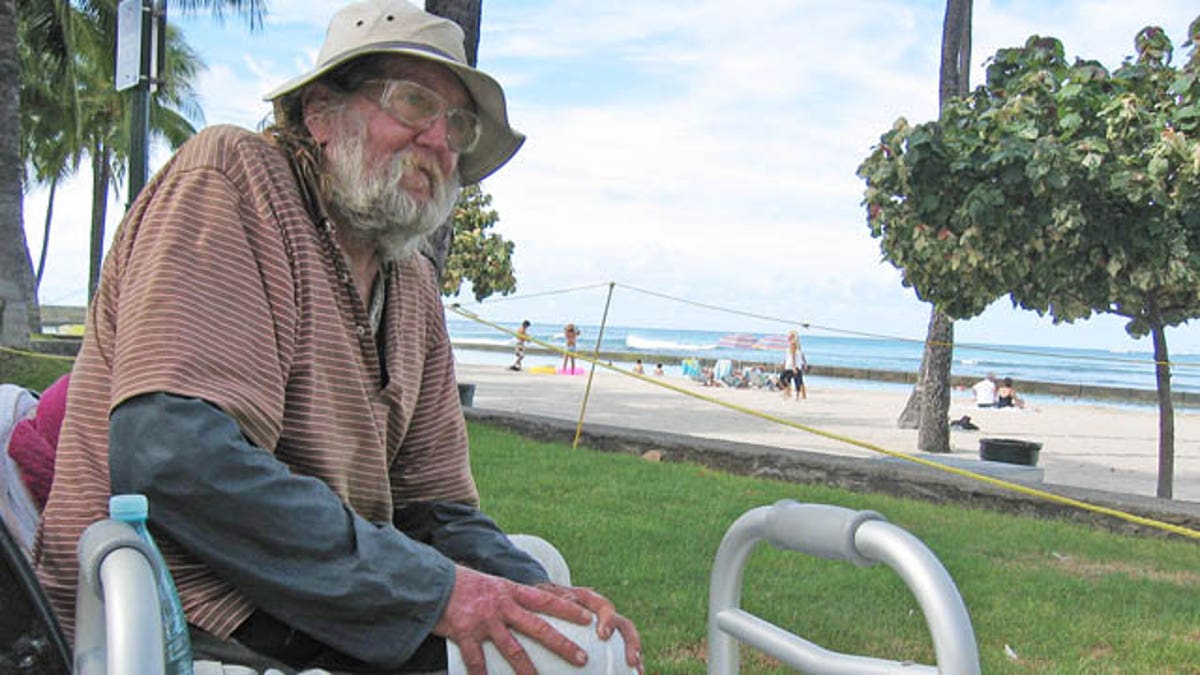
September 8, 2014: Jim Trevarthen, 62, watches the surfers near Waikiki Beach in Honolulu. Trevarthen is one of many homeless people who are unhappy with the city's proposals to ban sitting and lying down on sidewalks in the tourist mecca. (AP Photo/Cathy Bussewitz)
HONOLULU – The Honolulu City Council approved several measures Wednesday aimed at moving homeless people out of tourist hotspots in Hawaii, including one that bans sitting and lying down on sidewalks in the popular Waikiki area.
But a separate push to prevent homeless people from resting on sidewalks throughout the rest of the island failed.
The council has been under pressure from the tourism industry to act, with hotel representatives saying visitors complain often about safety and human waste.
The council responded, in part, by passing a measure that prohibits people using sidewalks as open-air restrooms on the island of Oahu.
"There's an expectation for Waikiki, for Hawaii. It's a dream," said Helene "Sam" Shenkus, marketing director of the Royal Hawaiian Center. "And because they're families and it's their money, they don't have to come here."
Alan Naito, general manager of Ohana Waikiki East Hotel, said he regularly sends his employees to clean up human waste in a nearby park where he recently saw someone preparing to go near a coconut tree in broad daylight.
"It's a very important photo-op area with the Princess Kaiulani statue," Naito said, referring to the sculpture depicting the heir to the throne of Hawaii's monarchy when it was overthrown in 1893.
But critics said the proposals criminalize homelessness instead of providing assistance to vulnerable people.
"We're helping the public to view the homeless as faceless people -- not even people, but objects to sweep away," said Councilman Breene Harimoto, who voted against all the proposals except the ban on urinating and defecating in Waikiki. "I'm very disturbed by this."
Homeless people in Waikiki say the bans won't change their lives much, because they are already often cited for camping -- racking up tickets they can't afford to pay.
"They're trying to harass everyone, and they're doing a pretty good job of it," said Jim Trevarthen, 62, a former surf instructor and carpenter who now lives on the streets.
The city also is planning a temporary legal campsite on a remote, mostly industrial island far from resorts. Some of Oahu's estimated 4,700 homeless people would be allowed to camp on Sand Island, which was used during World War II as an internment camp for Japanese-Americans and is home to a wastewater treatment plant and former dump. The camp should be operational within two to three months, and the goal is to move about 40 homeless people from Waikiki to the camp, city officials said.
Honolulu Mayor Kirk Caldwell's administration is planning to implement a program that will provide permanent housing for the chronically homeless on Oahu. But it will be about a year before people can move in, so the city proposed the Sand Island encampment to provide a place to go after the sit-lie bans went into effect.
"On any given day there are more than 100 shelter spaces available, but folks asked for a different option, so this is a different option," said Pamela Witty-Oakland, director of the city's department of community services.
Caldwell gets several letters every week from tourists, especially from Asia, who complain about interactions with Hawaii's homeless people, said Jesse Broder Van Dyke, a spokesman for the mayor. But Waikiki's bars also draw clubbers who do their share of urinating in public, said activist Kathryn Xian.
"The solution to that is more public restrooms, period, open late at night, not taking people who are poor out of a district against their civil rights," Xian said.
Xian raised concerns about toxic contamination in the area of the proposed encampment. City officials said they plan to lay down asphalt to cut the path of toxins, and to conduct more research.
Tourists come to Hawaii to experience the feeling of aloha, not to go to high-rise buildings and fancy shops, said Sam Kapu, senior pastor at New Hope Voyager.
"That aloha cannot be translated into money or dollar signs," Kapu said. "Aloha can only be translated to the building of relationships and helping out another brother or sister in need."
The approved bills now go to Caldwell for his approval. The lease for the Sand Island encampment will be discussed in a meeting of a state board Friday.




